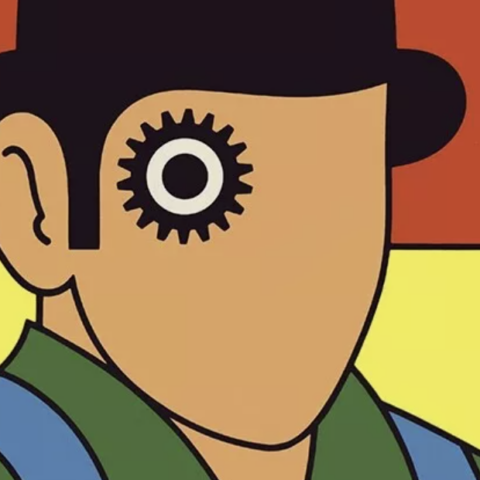Flower Heads
By Brindley Hallam-Dennis
Love short stories? Then why not read our latest Flower Heads.
The old garden was ablaze with colour, rampant with foliage. The Government Inspector had given it the once over and issued a Re-Wilding Order.
Jeri was going to ask, but where are we going to grow our food?
But Jeri imagined the GI replying, in a patronising voice. Your food is grown in America.

The fact is the garden was not worthy of Heritage Garden status, and wasn’t capable of incorporation into the neighbouring farm. It did lie adjacent to the old road however, from which the tarmac had recently been lifted, making it an official Wildlife Corridor. This was good for everybody. Except Jeri. Though, taking the long view, it was good for Jeri too, because the ‘sacrifice’ would be recognised and Jeri’s name would be added to the list of village ‘heroes’.
That had been eighteen months ago.
You keep a five foot access strip around the house, the GI had said. And I’d advise you to fence it securely, in case you actually have to do any work out there. And get everything you need out of the garden shed and store it indoors. There’s no need to remove the shed as it’s bio-degradable. The Government prided itself on taking a long view, as opposed to the short-termism of the other party’s administration.
Apart from that Jeri had passed with flying colours, kept the list of ten permitted non-family visitors, retained places on most of the non-family visitor lists others had added them to, and had access to in-store shopping in half the stores which had been applied for. That’s a higher than average acceptance rate, the GI had observed.
Jeri remembered the days when there had been ‘trusted suppliers’. Now it was ‘trusted customers,’ and three trustees had to nominate you too, and if you screwed up all four of you would be back at the online counter and paying for the privilege.
So it was only the garden really.
Jeri was amazed, gob-smacked might be a preferred word, at how quickly Nature had ‘come back’. It wasn’t as if they were in the tropics. Even with climate change, and the unexpected rush of the sea over the flat lands to the north, this part of England was not what anybody could call tropical. But Nature had come back. The roses had gone crazy all around the lawn. They were old fashioned varieties and didn’t flower for long, but while they were in flower they were magnificent, with thousands of tiny flower heads of a pale pink colour, and when, after only a couple of weeks at best, they fell, the grass was absolutely covered, though now it was longer the effect was lost to some extent.

Even the ornamental trees seemed suddenly bigger. They had filled out as if some restraining, civilising will had been withdrawn. He wondered if the wildlife had felt the same pulse of freedom.
Jeri remembered the days when you could take a cup of teas and a biscuit out to the garden. Well, a packet of biscuits, perhaps, but you could work it off afterwards, cutting the hedges or mowing the lawn. Jeri still enjoyed the garden; well, enjoyed looking out over it: the seed heads dancing in the wind; the birds shrieking their warnings when something unseen threatened. It was still possible, legally, to cross to the shed, but Jeri had been spooked by noises in the undergrowth that could not be explained, rationally. Something was living in or near the ruins of the shed. Perhaps it was a fox. Or a badger. Or something else.
Someone had come to look at the house. They’d looked at the garden, over the security fence outside the dining kitchen. Garden? They’d said with a rising inflexion. You livin’ too close to the bush, man. They hadn’t put in an offer.
Most disturbing were the gnawed heads on what had been the lawn. They weren’t visible from the dining kitchen, which was a relief, but from the window in the spare bedroom, now categorised as ‘storeroom’ for tax purposes and where what they needed from the shed had been stowed, you could see them.
They were sheep’s heads, as far as you could tell. Feral sheep are spreading at an alarming rate in the area. There were never any bodies. Just the heads, the teeth showing an off white tinged with yellow. Jeri had expected rabbits, but there were no rabbits. The rabbits had vanished.
Next door’s garden had been full of them. Jeri had spent hours blocking up holes and thin places in the hedge, trying to keep them out. We’ll be overrun, he’d said, after the Banning Order came into force. Not that it would have mattered any more. But the rabbits had vanished within a few weeks.
Sheep had wandered down the lane. The neighbouring farm doesn’t do sheep any more, obviously, but they bred up on the high fells. Tough, semi-wild at the best of times, they didn’t need the sheep nuts that lowland sheep lived on. They would ignore them, didn’t know what they were. They lived off the land, survived the winters, which were wet now rather than cold. They bred like rabbits, and died like flies, and kept the return of the native trees at bay while the government argued about the ethics of a cull.

But something was killing them. Something was killing them and bringing the uneaten heads and leaving them on what had been the lawn, just the other side of the fence that Jeri had erected, securely. Working on a fallen tree once in a fellside garden Jeri had felt something crack and give way, and had looked down to see the carcase of a sheep, the bones picked clean of meat, tendon, skin. Even the fleece had disappeared.

Jeri could remember when Snowy used to bring little gifts. Birds mostly, with the occasional mole, and mice of course; lots of those. Snowy never hunted the rabbits though, even when they broke through the barricades and came into the garden, which was always a disappointment.
They hadn’t brought everything in from the shed. Why would they? Most of it was gardening stuff, and might as well go to hell with the building itself, seeing as they wouldn’t have any garden to use it on. Flower pots, for house plants they’d brought in, and, perversely Jeri thought afterwards, the garden furniture. They’d planned to use that along the five foot access strip, but the sun rarely fell on that, and besides, it was too cramped to be comfortable. Nowhere outside was as comfortable anymore; not as comfortable as you might have expected.
Jeri had always taken walks up the lane and round the block, a couple of miles in all, but after the tarmac was lifted, and they didn’t bother to smooth off the exposed sub-strata, it became hard work, tiring, irritating rather than bracing, a slog in fact. And once a stray cow, and heaven knows how it came to be there after the farm had switched to arable, well, not a cow so much as a young stirk, frisky, nervous, curious, even belligerent, had stomped unexpectedly around the bend up near the ruined barn. Jeri and the beast had both come to an abrupt halt, glared at each other, and then the animal come on causing Jeri to cry out involuntarily, which had sent it skittering back out of sight.
There was, quite clearly, an animal track, a hollow pathway through the old rose bushes where something the size of a dog must have pushed through repeatedly, leading onto the old lawn. Perhaps it was coming in from the old lane, or had a lair near the shed.

Snowy had always vanished in the spring. He’s getting his end away, Jeri used to joke. He’d be away sometimes for a whole fortnight, and then come back, his tail erect and like a bottle brush, purring and rubbing himself against your legs for food. Often he’d bring his little gifts then and leave them by the kitchen door. They would have had him neutered were it not for the lock down and the Changes. And then he’d vanished for good, after the tarmac was lifted.
Whatever it was that was bringing the heads, surely, Jeri thought, must be feeding a family of some sort off the rest of the carcase.
He looked out towards the shed. It seemed further away than it had done. The paint had faded now, and a sharp winter storm had ripped the felt off half the roof. One of those jobs he’d seen coming but not got around to before the Changes. There was a sort of slashing tool they’d left in there, like an old medieval battle-axe, but made of modern carbon-steel and with a heavy duty plastic handle. It had cost a fortune and he’d used it on the hedges around the orchard. He should have brought it inside the house, kept it by the kitchen door, just in case whatever was bringing the heads grew big enough to leap one day over the security fence, dragging the head with it.
All images called ‘Jeri’s dream’ exclusively made for .Cent by Emma June Roze. Find her on Instagram here
If you enjoyed flower heads then one not read another story by Brindley Hallem-Dennis the Tinkerbell Conclusion here



